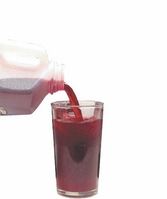Sorrel, so divine!
Published: Saturday | December 12, 2009

Sorrel has been synonymous with Christmas although it is available all year now. Zion Organic (2004) dubs sorrel nature's non-carbonated soft drink made from bright-red flower sepals.
Jamaican sorrel, also called roselle, a member of the hibiscus family, is an East Indian variety and is now accepted as an important nutraceutical in diet and nutrition.
Sorrel leaves resemble spinach in shape and range in colour from pale to dark green. Grown for centuries in Asia, Europe and North America, sorrel leaves are frequently used in French cooking, for example, to add a refreshing touch to any sandwich. Young sorrel leaves are excellent when lightly cooked and has a taste similar to cooked spinach. Older leaves can be used for soups and stews because they add tang and flavour to the dishes.
Sorrel is more flavourful when served fresh. To select sorrel, choose stems with bright-green, crisp and arrow-shaped leaves.
Nutritional value
A half-cup of sorrel, chopped contains:
Calories:
Protein:
Carbohydrate: 2.1g
Total fat: 0.5g
Fibre: 1.9g
Sorrel is also rich in vitamins and minerals, including vitamins A and C, calcium, magnesium, niacin, riboflavin. It is also rich in flavonoids, powerful antioxidants which help to scavenge the body of free radicals against certain types of cancers. Research by Northern Caribbean University in Mandeville Jamaica demonstrated that sorrel has the potential to destroy certain cancer cells.
Sorrel water
Sorrel water may contribute to significantly decreasing cholesterol and triglyceride levels in the blood. The Scientific Research Council (SRC) suggests drinking sorrel water daily to decrease the risk of heart disease. Sorrel promotes proper kidney function and is considered a diuretic. It may also stimulate the production of bile by the liver. Some varieties of sorrel help ease haemorrhages, gonorrhoea, chronic catarrh and urinary infections.
CAUTION!
Sorrel is high in oxalic acid, so it may not be good for everyone. Oxalic acid may aggravate rheumatism, gout and kidney stones, so one has to take small doses. As sorrel ages, it tends to build up more acid because of the presence of oxalic acid, which actually gets stronger and tastes more prominent. Sorrel is a natural laxative, so overconsumption could result in problems for the drinkers.
COOKING WITH SORREL
The SRC has developed, through its Hope Gardens label, an excellent sorrel chutney as well as sorrel squashes. The sorrel chutney is the perfect substitute for the delectable taste of traditional American Thanksgiving cranberry sauce for roast turkey.
Christmas would not be the same without sorrel drink.
Food safety
1.When making sorrel drink, do not use aluminium pots to steep sorrel as it 'draws' the aluminium. You may recall a change in the colour of the aluminium pot after straining the sorrel.
2. Take extra care to wash sorrel sepals before 'drawing' the sorrel. When the sorrel is picked from the stem and they are taken to market, it is important to wash properly.
Sorrel sauce
Ideal for your Christmas roaster, turkey ham and roast beef.
1/2 cup sorrel sepals, finely chopped
1 cup sorrel drink
1 onion, chopped
1 teaspoon allspice
6 whole cloves
1/2 Scotch bonnet pepper, finely chopped
Combine the ingredients in saucepan and place over medium heat and slowly reduce to desired consistency. Ensure that sepals are soft but not overcooked. Store in a glass container and use as needed.
Heather Little-White, PhD, is a nutrition and lifestyle consultant in Kingston. Send feedback to saturdaylife@gleanerjm.com.

Jamaican sorrel drink
6
1-inch piece fresh ginger, sliced
3 two-inch pieces orange peel
5 dry pimento berries, crushed
3 whole cloves, crushed
12 cups boiling water
1 1/2 cups sugar
Juice of 1 lime
Place the sorrel, ginger, orange peel, allspice and cloves in a large stainless-steel or glass bowl or pot. Pour in 10 cups of boiling water and stir. Cover and leave to steep for 24 hours. Strain out the liquid through a sieve. Boil the remaining 2 cups of water and blend it with the sugar until dissolved. Add the sugary water to the strained liquid, along with the lime juice. Stir to blend completely. Sweeten further, if desired.
Optional: Add a dash of white rum for extra spike.
Source: Jamaican Cooking
